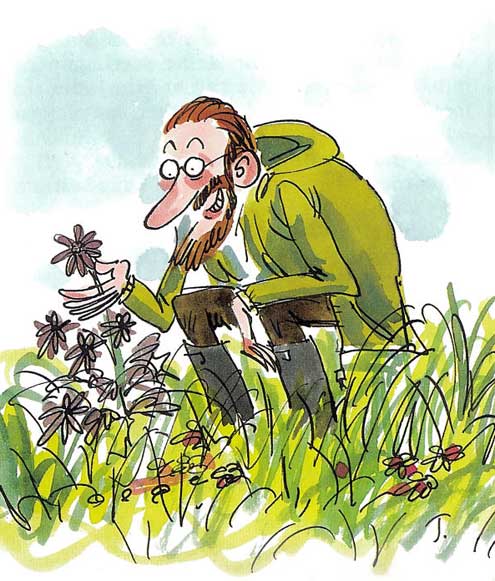Farming Breeds: Martin – the conservation adviser

Join us for a funny, irreverent look at some of the characters that make the British countryside what it is. Our tongue-in-cheek guide puts characters such as the retired Major, the “perfect” next-door farmer and the young tearaway under the microscope. Here we meet Martin, the conservation adviser, who dreams that one day every farm will have a wetland habitat.
Martin advises farmers on conservation schemes. Certain butterflies make him very excited. He’s never happier than when crouching in long, wet grass, poring over rare plants.
Martin’s got a beard, votes for a party very few people have ever heard of and holidays abroad once a year. He’s got a range of different-coloured cagoules and wears wellies for farm visits – but his preferred choice of footwear is the sandal. “So much more comfortable – they let my feet breathe,” he says, smiling, his round glasses perched precariously on his pointed nose.
The mere sight of a newt causes his heart to pump faster, his blood to race. He feels his skin tingle. It’s a feeling Martin’s wife, Barbara, hasn’t engendered in him for a long time. Not since last year’s holiday, in fact – the night they shared two-thirds of a bottle of white wine.
He’s got a degree with the word “environment” in the title and a PhD that involved counting small animals, then drawing lots of graphs and repeatedly writing the words “correlation” and “hypothesis”.
His chief area of expertise is the newt. “A much-misunderstood creature,” he says. The mere sight of one causes his heart to pump faster, his blood to race. He feels his skin tingle. It’s a feeling Martin’s wife, Barbara, hasn’t engendered in him for a long time. Not since last year’s holiday, in fact – the night they shared two-thirds of a bottle of white wine.
Though he speaks of partnership, Martin is a bit suspicious of farmers and his relationship with some of them is a little strained. “That lefty,” one or two of them call him. “The beardy weirdy,” is how the more uncharitable ones refer to him.
When people talk about grass, he gets mildly irritated. It’s not just grass. It’s an intermediate perennial ryegrass ley or a low-fertility herb-rich sward. He doesn’t, of course, show people he’s irritated – he dons his favourite cagoule and takes a long brisk walk, heartily shouting “Morning” at anyone who passes.
Martin’s got a dream – it’s that one day every farm will have a wetland habitat. They’ll be teeming with plants and birds and small, furry animals and the diversity of fish will be indicative of the ecosystem’s healthy status. He ponders this over lunch, sitting in a lay-by munching carefully-quartered organic stone-ground bread sandwiches. “One day,” he thinks. “One day.”
Since Martin got promoted, he spends more time in the office than he would like to. He misses the old days when he was a “foot-soldier” – he really felt as if he was making a difference then. Now, it’s mostly meetings and management. Paperwork and politics. His reports have sections titled “Executive summary” and “Key recommendations”. The job’s more report writing than anything else these days, he rues, scratching his beard – itself almost worthy of SSSI designation.
“But mustn’t grumble,” he thinks. It’s the weekend soon and Martin’s going bird watching with the children. Bird watching and walking. There’ll be lots of lovely flowers to show the kids – assuming, that is, those nasty farmers haven’t ploughed them all up.
